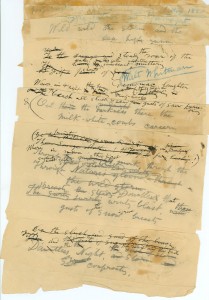Writing for any audience is to live in a state of continual chagrin.
Over a long and fortunate career, I have written a lot: a natural condition for someone talking and writing about rhetoric. How many readers I’ve had remains a mystery, probably one that is better left unexplored. Even so, books, blogs, articles and reviews have kept me busy. I suspect it is equally true for folks who manage a staff partly through e-mail, write a lot of reports, or respond to customers or clients. With all the practice, we might expect that communicating our thoughts in print would get easier. But I find that it never does. There is almost always a shock that comes with rereading a “finished” piece that has gone through the pipeline and emerged as less than the crystalline version I envisioned. Imagine lining up a set of cringeworthy photos of yourself that were all taken at the wrong time, then being forced to look at them every day. Writing for any audience is to live in a state of continual chagrin.
For sure, we need editors. But my experience is that most miss the same awkward wording or silly errors as well. We all seem to be too busy or lazy to be the kinds of close readers that catch an errant thought or a grammatical train wreck. For these reasons a lot of writers probably experience the equivalent of buyer’s remorse: the sinking feeling that what looked so good at first glance no longer scans so well. This fear is why some of my colleagues find it a challenge to let a manuscript go. Who knows how many studies of epochs or individuals languish because their authors want to keep improving them. Alas, I’m not burdened with this worry; haste is built into my DNA.
My theory is that all writers are still in training. We never fully master the components of literacy. Even the most polished pieces can still reveal the equivalent of a shirt tail that is hanging out. This illusive quest for perfection makes it all the more fun to read an author who seems to have polished every sentence to a fine shine. Such writing or speaking is a wonderful thing to experience. But for the rest of us, there’s nothing to do but soldier on, hoping that next time we will do a better job of sorting out our thinking before it is committed to pixels and pages.
![]()

 As the eyes strain with the load, it can be a relief to sit back and let Fred have a go at your mangled prose.
As the eyes strain with the load, it can be a relief to sit back and let Fred have a go at your mangled prose. 